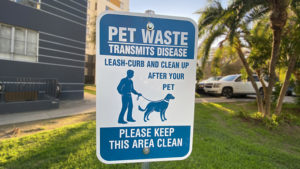Homeowners association pet restrictions are commonplace in any planned development. But, deciding what pet policies your community should have in place is a little trickier than it might initially seem.
Are Homeowners Association Pet Restrictions Legal?
First things first, is it even legal for a homeowners association to enact pet restrictions? The short answer is yes. Generally speaking, associations do have the power to impose pet rules. Some HOA communities even go as far as to prohibit pets entirely, though not all state laws allow this.
Homeowners who have a problem with their association’s pet policies should first look to federal and state laws for guidance. Remember that these laws take precedence over any other provision or policy in your community. In California, for instance, associations can’t have a no-pets policy. According to Civil Code Section 4715, HOAs must allow homeowners to keep at least one pet.
Next, homeowners should check their association’s governing documents. An HOA’s bylaws and CC&Rs should outline the association’s authority when it comes to enforcing pet restrictions.
How Pet Restrictions Help the Community
Pets are great. They offer companionship and, for some people, are totally non-negotiable. But, the fact of the matter is, homeowners associations generally can regulate pets in the community. Why is that?
First and foremost, it is imperative to know what the purpose of an HOA is. Fundamentally, a homeowners association’s primary function is to preserve property values by maintaining the community and enforcing rules. Part of this is imposing HOA pet rules so that everyone in the neighborhood remains happy.
Let’s face it — pets can be messy and noisy. This is especially true when it comes to the most common type of pet: Dogs. A messy or dirty community is certainly not appealing, and neighbors will start to complain sooner or later. Noisy pets can also interfere with people’s right to quiet enjoyment. Furthermore, aggressive pets can pose a threat to the health and safety of community members.
Pet policies and, by extension, homeowners association dog rules address all of these issues.
What to Consider for Your HOA Pet Policy
 If you don’t already have a pet policy in your association, now is the time to create one.
If you don’t already have a pet policy in your association, now is the time to create one.
The specifics of these homeowners association pet restrictions can vary from community to community, but they generally follow the same basic types. Such limitations are often referred to as reasonable restrictions.
Many communities regulate the species homeowners can keep as pets. For example, dogs and cats are permitted, but snakes and monkeys are not. You can even take it a step further and restrict the breeds. If you allow birds in your community, for instance, you can prohibit certain breeds such as eagles and vultures.
You can also add an HOA pet weight limit or size limit to your policy. For example, as part of your HOA dog rules, homeowners can keep dogs as pets, but no dog must go over 50 pounds. Another common restriction has to do with the number of pets. You may be wondering, “Can HOA enforce pet limit?” In general, associations can limit the number of pets homeowners can keep.
Finally, a good pet policy should state that homeowners are responsible for their pets at all times. You can require owners to keep their pets on a leash or in a cage outside of their own homes. It is also normal to require owners to clean up after their pets and shoulder liability for any damage or injury their pet may cause.
Other sample HOA pet policies include requiring pets to be neutered or spayed and requiring that all pets remain updated on their vaccinations and shots.
Enforcing HOA Pet Restrictions
Like with other covenants and rules, your HOA board is responsible for enforcing your pet policies in a uniform and consistent manner. If an owner violates a pet rule, most boards first send a notice of the violation and give the offender a chance to remedy the situation. Should the owner refuse to comply, though, you can normally take further action.
While the actions a board can take can vary depending on the provisions of their governing documents, violations usually carry a monetary penalty. Owners will need to pay a fine as a result of the violation. Your board may even be able to suspend member privileges or take legal action.
Can HOA Make Me Get Rid of My Dog?
This is a common question many homeowners ask, and one without a straightforward answer. It all really depends on the situation.
If a homeowner refuses to comply with a pet rule, your board can file a civil lawsuit asking the court for injunctive relief. In other words, you can ask a court to order the owner to remove the animal. Sometimes, even with a court order, an owner will still refuse to comply. In that case, the judge can have a sheriff remove the animal by force and then hold the owner in contempt. This means the owner may face a monetary fine or even time in jail.
The answer is different, though, when it comes to retroactive application of HOA pet rules. If a member already owns a dog, and your board enacts a new rule prohibiting dogs, then you can’t force the member to get rid of their dog. The same goes for amendments to HOA dog restrictions. For example, if your association previously did not have a weight limit and now chooses to prohibit dogs over 50 pounds, you likely can’t enforce that new restriction on a member who already owns a 55-pound dog.
HOA and Emotional Support Animals & Service Animals
 Can HOA deny emotional support animals?
Can HOA deny emotional support animals?
Even with a no-pets policy, your association must allow disabled members to keep assistance animals such as emotional support animals. This is in accordance with the federal Fair Housing Act (FHA) and even some state-level Fair Housing laws.
Under the FHA, housing providers such as HOAs can’t discriminate against people based on their disability. It also requires HOAs to provide reasonable accommodation for disabled persons. This includes letting a person with a disability keep an assistance animal no matter what your pet policies say.
Similar provisions exist within the Americans with Disabilities Act, though this Act defines service animals as dogs with specialized training. But, according to the FHA, even without specialized training, emotional support animals are considered assistance animals.
It is important to note that disabled members must still follow homeowners association pet restrictions that don’t interfere with the animal’s ability to support the person. This includes keeping the animal on a leash and cleaning up after them. But, restrictions related to pet species, breed, and size are unenforceable.
If your association faces such an issue, it is best to consult an attorney for guidance. This way, you can protect the HOA and your board from potential liability.
Other Factors to Keep in Mind
Amending your governing documents is not always easy. It is usually a long, drawn-out process that requires a majority vote from your membership. With this in mind, you should first consider the implications of changing your current rules. Think about how these rules might affect the homeowners in your community. Consider how members will respond to the proposed changes.
More importantly, when crafting your homeowners association pet restrictions, use specific language. Cover as much ground as possible to avoid room for misinterpretation. For example, if you require owners to keep their pets on a leash, indicate when and where they should do so. Is it limited to certain common areas only or every time they take them out of the house?
Again, the help of an HOA attorney is crucial here. You want to make sure your rules don’t conflict with existing provisions or federal and state laws, and you need an attorney for that.
Pet Rules Are Essential for All Communities
Homeowners association pet restrictions are often controversial, but that does not mean your board should stay away from them. In fact, these restrictions add to the quality of life within the community. Crafting them, though, takes a delicate hand and adequate forethought.
Having trouble creating and enforcing your pet restrictions? Elite Management Services can help. Give us a call today at (855) 238-8488 or email us at help@emspm.com to learn more about our services.
RELATED ARTICLES:
- When Neighbors Fight: How To Handle HOA Neighbor Disputes Fairly
- How To Change HOA Rules?
- Dealing With HOA Violations For Homeowners






